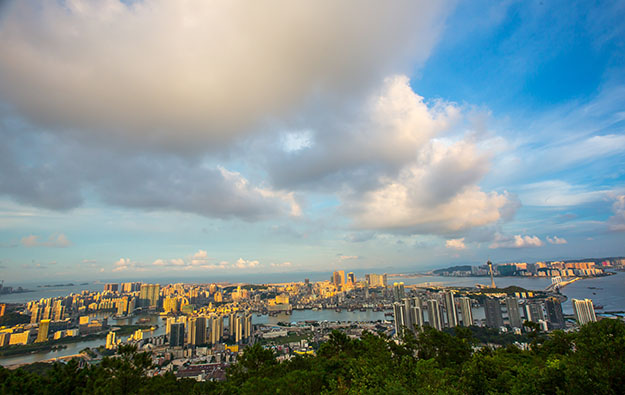Bear case sees virus roil Macau until autumn: analysts
Feb 20, 2020 Newsdesk Latest News, Macau, Top of the deck

The worst out of three scenarios in 2020 for the Macau casino market might see the coronavirus alert continue to disrupt gaming business into the autumn, “with only slow and gradual pickup” in visitor volume to the city, said a Thursday report from brokerage Sanford C. Bernstein Ltd.
On Thursday, the city’s casinos had begun a phased reopening for most of their shuttered properties, but with no immediate sign of a strong pickup in tourism demand, and with only circa 30 percent of gaming capacity in use.
On Tuesday this week tourists – who bring in the bulk of the city’s gaming revenue – registered only 5,800 arrivals, according to government data. In 2019 the statistical daily average was circa 108,000 tourist visitors per day, based on that year’s tally of 39.4 million arrivals.
The mainland authorities have additionally stopped issuing until further notice exit visas for mainland residents wishing to travel independently to Macau or other places, and for tour groups.
Events linked to the coronavirus alert are evolving day-by-day, and Sanford Bernstein observed it was hard to make predictions with confidence about “how the addressable market” for Macau gaming might recover and “how cost structure may change”, and what effect “regulatory changes may have on valuation and forecasts”.
But it noted that in a “bear” case, Macau-market gross gaming revenue (GGR) for 2020 might fall by “approximately 43 percent” and Macau gaming companies might see earnings before interest, taxation, depreciation and amortisation (EBITDA) fall by “57 percent to 86 percent”.
The institution said those Macau operators with higher exposure to the United States market – particularly MGM Resorts International “and to a lesser extent”, Wynn Resorts Ltd – were “more shielded from the downside the Covid-19 outbreak”, the latter being the name now given to the pathogen said to have emerged as a threat to human health via China’s Hubei province.
Sanford Bernstein said its middling scenario – which it called “conservative” – assumed coronavirus infections globally might peak by early summer, leading to a “modest” recovery in Macau casino business in the third quarter, followed by “more robust strength” in the fourth quarter.
“In this case, we expect 2020 GGR to fall by approximately 21 percent and Macau gaming companies experience EBITDA declines of 33 percent to 42 percent,” stated analysts Vitaly Umansky, Kelsey Zhu and Eunice Lee.
The institution’s “bull” scenario assumed a more optimistic outcome, with Covid-19 “running out of steam reasonably quickly,” with “strong rebound” in Macau casino business in the second half 2020, notwithstanding year-on-year declines in the first half.
“In this case, we forecast 2020 GGR to fall by over 11 percent and Macau gaming companies would see EBITDA fall 12 percent to 26 percent,” said the brokerage. It suggested that MGM Resorts, Wynn Resorts and Las Vegas Sands Corp, respectively the U.S. based-parents of three Macau operators, might find themselves “faring better”.
The Morgan Stanley banking group observed in a Wednesday memo, that Macau gaming stock valuations had been “resilient despite casinos being closed for the last two weeks”. The institution’s analysts Praveen Choudhary, Gareth Leung and Thomas Allen said they expected currently that Macau-market first-quarter GGR would decline by 45 percent year-on-year and “improve to -26 percent year-on-year in second-quarter 2020 and normalise by third-quarter 2020,” to +3 percent year-on-year.
Morgan Stanley stated that its new annual GGR growth estimates for 2020 and 2021 respectively were -16 percent, compared to an earlier forecast of -2 percent, and +20 percent, from an earlier estimate of +10 percent.
Related articles
-
 Melco to get 50pct casino EBITDA at Sri...
Melco to get 50pct casino EBITDA at Sri...Jul 10, 2024
-
 Some players avoiding Macau amid cash...
Some players avoiding Macau amid cash...Jul 02, 2024
More news
-
 Donaco EBITDA up y-o-y to above US$4mln...
Donaco EBITDA up y-o-y to above US$4mln...Jul 26, 2024
-
 HK listed Palasino upgrades Czech...
HK listed Palasino upgrades Czech...Jul 26, 2024
Latest News
Jul 26, 2024
Border-casino operator Donaco International Ltd has achieved a 164.17-percent year-on-year increase in its latest quarterly group earnings before interest, taxation, depreciation and amortisation...Sign up to our FREE Newsletter
 (Click here for more)
(Click here for more)
Pick of the Day
”We’ve got more traction outside of Macau at the moment. But Macau’s going be a bigger focus for us”
David Punter
Regional representative at Konami Australia
Most Popular
 Sheraton brand to exit Londoner Macao, to be Londoner Grand July 25, 2024
Sheraton brand to exit Londoner Macao, to be Londoner Grand July 25, 2024  Macau regulator probes unlicensed gaming agents July 24, 2024
Macau regulator probes unlicensed gaming agents July 24, 2024  Philippines gives 20k aliens in POGOs 60 days to leave July 25, 2024
Philippines gives 20k aliens in POGOs 60 days to leave July 25, 2024  Philippines-listed DigiPlus says not affected by POGO ban July 24, 2024
Philippines-listed DigiPlus says not affected by POGO ban July 24, 2024  Sands China 2Q EBITDA down q-o-q amid low hold, renovation July 25, 2024
Sands China 2Q EBITDA down q-o-q amid low hold, renovation July 25, 2024






